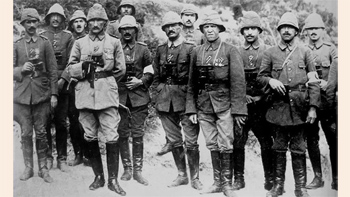Mustafa Kemal Atatürk, the founder of the Republic of Turkey, is a figure of monumental significance in both Turkish history and the broader narrative of the 20th century. His leadership transformed a fallen empire into a modern, secular, and national state. Born in 1881 in Salonika, then part of the Ottoman Empire, Atatürk rose through the military ranks to become a visionary leader who would redefine a nation's destiny.
Early Life and Military Career
Atatürk's early life was characterized by education in military schools, where he excelled and displayed early signs of his leadership capabilities. His military service began in earnest, and he quickly rose through the ranks. He served in various posts, showing great tactical skill, especially during the Gallipoli Campaign of World War I, where his leadership was instrumental in the Ottoman victory. This early glimpse of his strategic genius laid the groundwork for his later reforms.
The Fall of the Ottoman Empire
At the end of World War I, the Ottoman Empire faced partitioning by Allied Powers, which ignited the Turkish War of Independence. Mustafa Kemal, who would later adopt the surname 'Atatürk', meaning 'Father of the Turks', led the Turkish National Movement in this conflict. His military acumen turned the tide in favor of Turkish forces, culminating in the establishment of the Republic of Turkey in 1923, with Atatürk as its first president.
Reforms and Modernization
Atatürk's vision for Turkey was revolutionary. He believed in the separation of religion and state affairs, a radical shift from the Ottoman rule. His reforms touched every aspect of Turkish life, from the alphabet and language to clothing and law. He replaced the Arabic script with the Latin alphabet, making education more accessible and fostering a sense of unity and identity. His legal reforms included the adoption of secular laws, replacing Islamic Sharia law, and giving women the right to vote and hold public office.
Economic and Educational Reforms
Atatürk didn't stop at cultural reforms; he also aimed to modernize Turkey's economy and education system. He established factories, built railroads, and launched state-sponsored programs to spur agricultural and industrial growth. In education, he promoted science and secularism, opening thousands of new schools, and reformed the existing ones, including the establishment of a national university system.
Republic Day and National Pride
In Turkey, Republic Day on October 29th stands as one of the most significant national holidays, commemorating the proclamation of the Republic of Turkey in 1923. It marks the day when Atatürk's dream of a sovereign, modern nation-state became a reality. The day is celebrated with patriotic fervor throughout the country, with citizens reflecting on Atatürk's legacy and the profound changes he brought about. Parades, ceremonies, and various events highlight the pride and unity of the Turkish people in their national identity and the accomplishments of their republic's founding father.
Legacy and National Identity
The legacy of Mustafa Kemal Atatürk is etched deeply into the fabric of Turkish society. He is celebrated for creating a Turkish national identity and for his unwavering dedication to the principles of the republic he founded. His mausoleum, Anıtkabir, is not just a memorial but a symbol of the Turkish nation's respect for the man who reshaped its destiny. His influence on Turkey's direction and policies continues to be felt, and his vision for a modern, progressive Turkey remains a touchstone for the nation's aspirations.
Mustafa Kemal Atatürk's life and achievements present a remarkable story of courage, vision, and transformation. His role in shaping modern Turkey from the ashes of an empire showcases the power of progressive thinking and leadership. As Turkey continues to navigate its path in the 21st century, Atatürk's principles of secularism, nationalism, and modernization serve as a guiding light, reminding us of the transformative power of determined leadership and vision.
